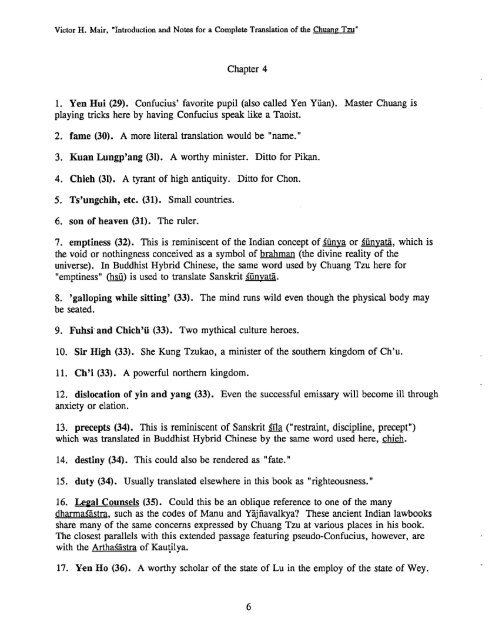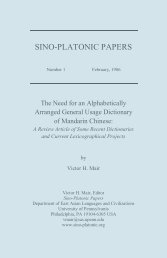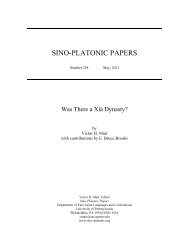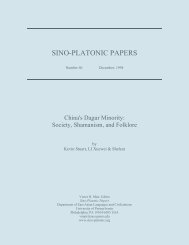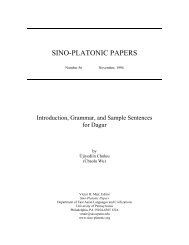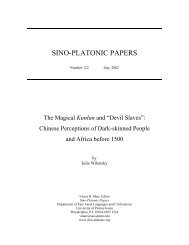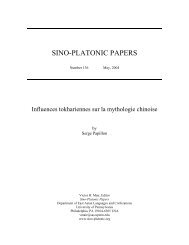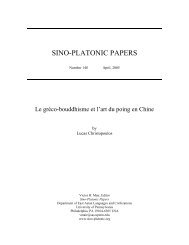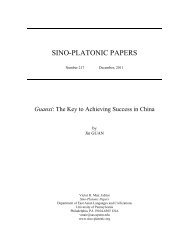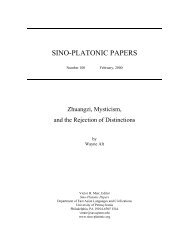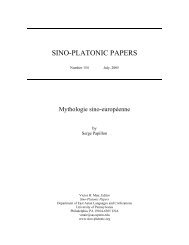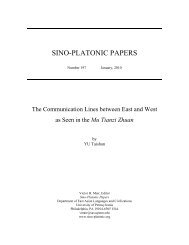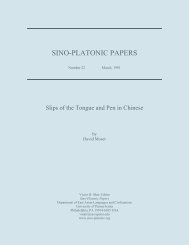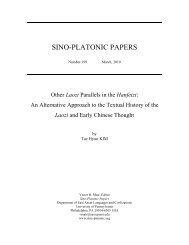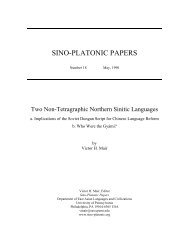Introduction and Notes for a Complete Translation of the Chuang Tzu
Introduction and Notes for a Complete Translation of the Chuang Tzu
Introduction and Notes for a Complete Translation of the Chuang Tzu
Create successful ePaper yourself
Turn your PDF publications into a flip-book with our unique Google optimized e-Paper software.
Victor H. Mair, "<strong>Introduction</strong> <strong>and</strong> <strong>Notes</strong> <strong>for</strong> a <strong>Complete</strong> <strong>Translation</strong> <strong>of</strong> <strong>the</strong> <strong>Chuang</strong> <strong>Tzu</strong>"<br />
Chapter 4<br />
1. Yen Hui (29). Confucius' favorite pupil (also called Yen Yuan). Master <strong>Chuang</strong> is<br />
playing tricks here by having Confucius speak like a Taoist.<br />
2. fame (30). A more literal translation would be "name. "<br />
3. Kuan Lungp'ang (31). A worthy minister. Ditto <strong>for</strong> Pikan.<br />
4. Chieh (31). A tyrant <strong>of</strong> high antiquity. Ditto <strong>for</strong> Chon.<br />
5. Ts'ungchih, etc. (31). Small countries.<br />
6. son <strong>of</strong> heaven (31). The ruler.<br />
7. emptiness (32). This is reminiscent <strong>of</strong> <strong>the</strong> Indian concept <strong>of</strong> Sonya or lnvatZi, which is<br />
<strong>the</strong> void or nothingness conceived as a symbol <strong>of</strong> brahman (<strong>the</strong> divine reality <strong>of</strong> <strong>the</strong><br />
universe). In Buddhist Hybrid Chinese, <strong>the</strong> same word used by <strong>Chuang</strong> <strong>Tzu</strong> here <strong>for</strong><br />
"emptiness" w) is used to translate Sanskrit iiinvat3.<br />
8. 'galloping while sitting' (33). The mind runs wild even though <strong>the</strong> physical body may<br />
be seated.<br />
9. Fuhsi- <strong>and</strong> Chich'ii (33). Two mythical culture heroes.<br />
10. Sir High (33). She Kung <strong>Tzu</strong>kao, a minister <strong>of</strong> <strong>the</strong> sou<strong>the</strong>rn kingdom <strong>of</strong> Ch'u.<br />
1 1. Ch'i (33). A powerful nor<strong>the</strong>rn kingdom.<br />
12. dislocation <strong>of</strong> yin <strong>and</strong> yang (33). Even <strong>the</strong> successful emissary will become ill through<br />
anxiety or elation.<br />
13. precepts (34). This is reminiscent <strong>of</strong> Sanskrit ("restraint, discipline, preceptw)<br />
which was translated in Buddhist Hybrid Chinese by <strong>the</strong> same word used here, chieh.<br />
14. destiny (34). This could also be rendered as "fate. "<br />
15. duty (34). Usually translated elsewhere in this book as "righteousness."<br />
16. Legal Counsels (35). Could this be an oblique reference to one <strong>of</strong> <strong>the</strong> many<br />
dharmafhtra, such as <strong>the</strong> codes <strong>of</strong> Manu <strong>and</strong> Yajiiavalkya? These ancient Indian lawbooks<br />
share many <strong>of</strong> <strong>the</strong> same concerns expressed by <strong>Chuang</strong> <strong>Tzu</strong> at various places in his book.<br />
The closest parallels with this extended passage featuring pseudo-Confucius, however, are<br />
with <strong>the</strong> ArthaSgstra <strong>of</strong> Kauiilya.<br />
17. Yen Ho (36). A worthy scholar <strong>of</strong> <strong>the</strong> state <strong>of</strong> Lu in <strong>the</strong> employ <strong>of</strong> <strong>the</strong> state <strong>of</strong> Wey.


